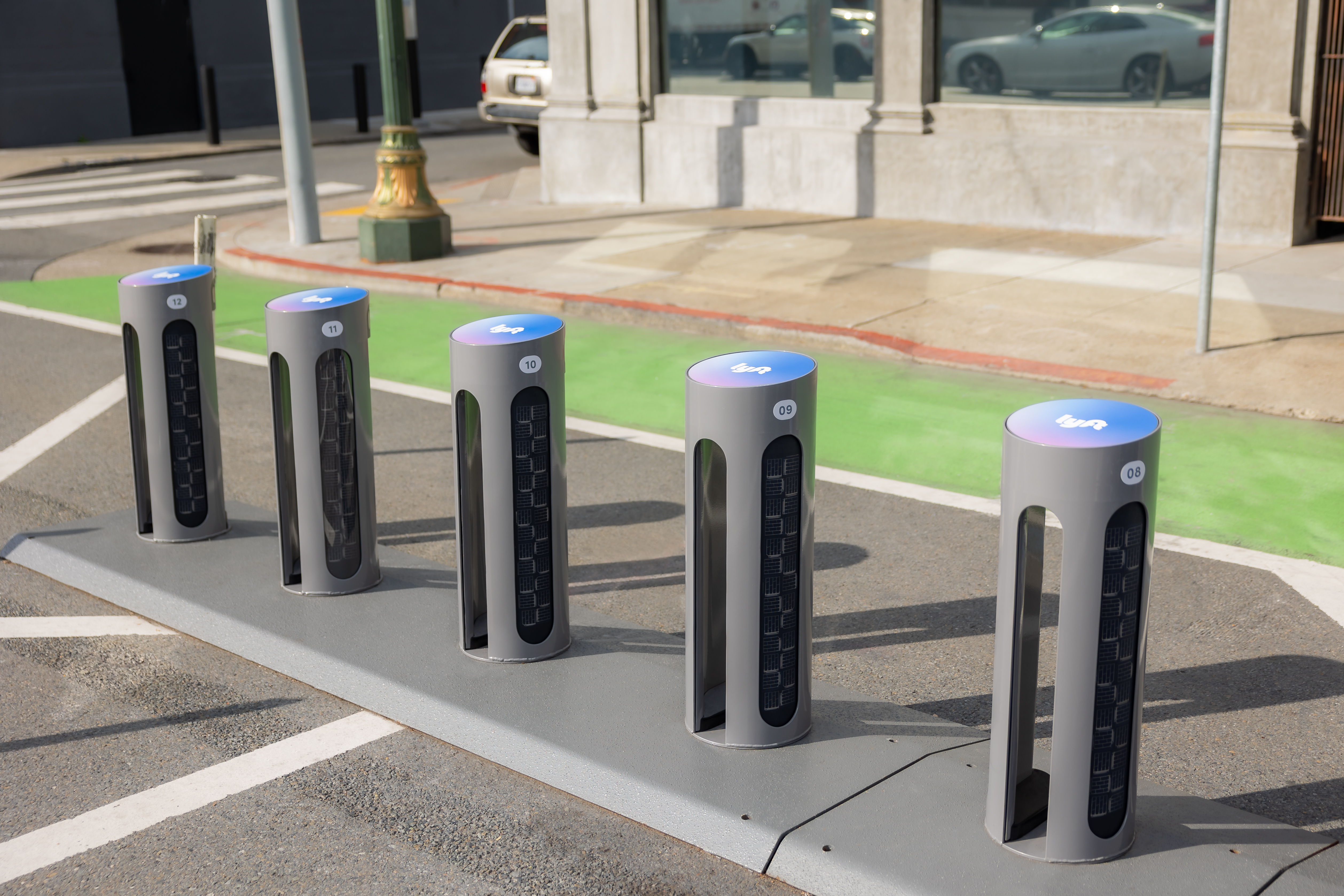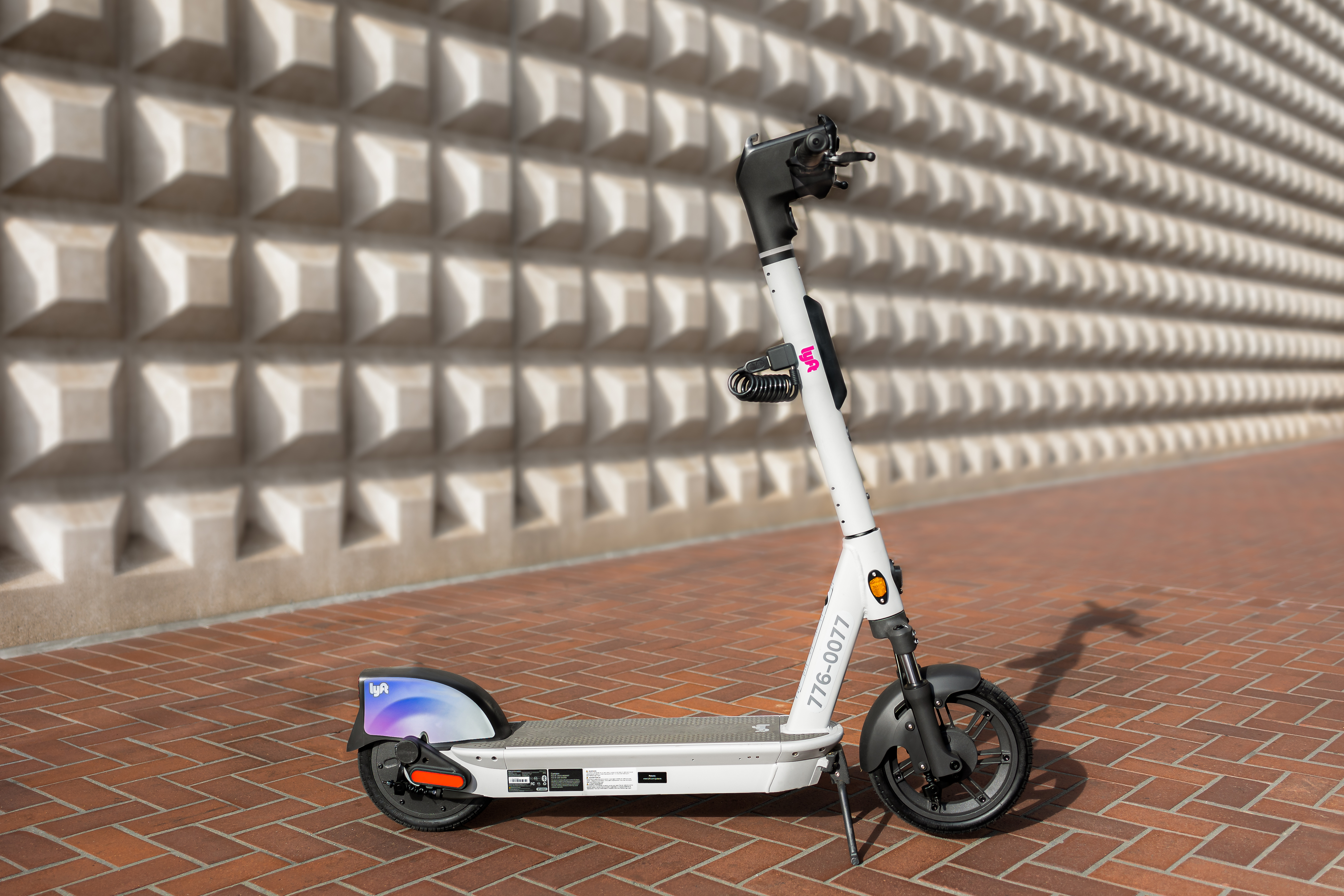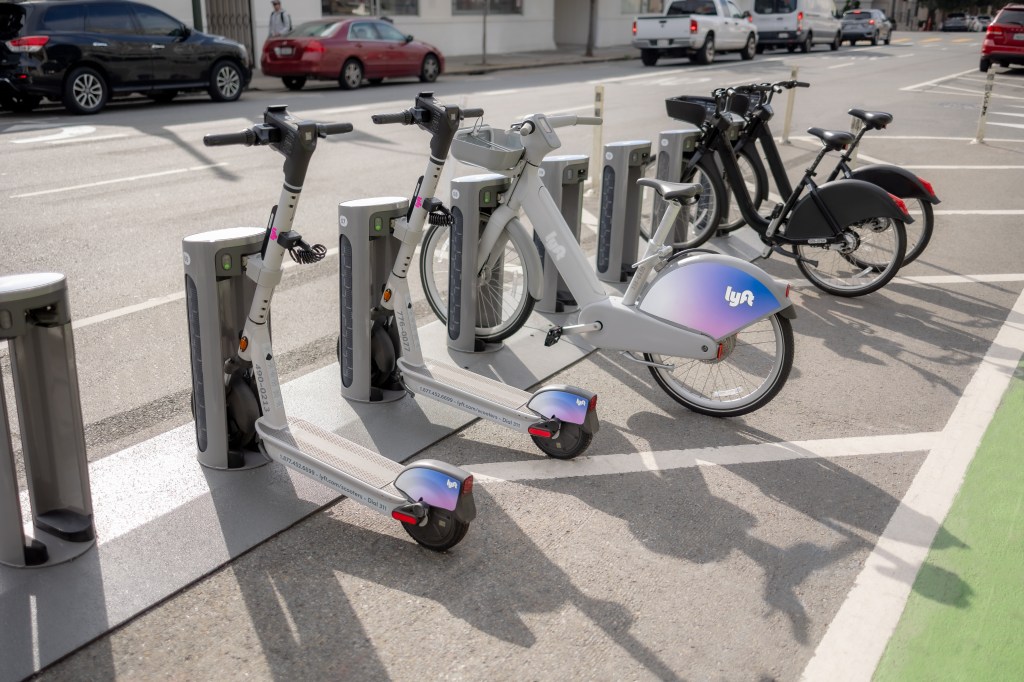Lyft wants to see a more organized shared micromobility landscape, with fewer free-floating scooters and more dependable, docked vehicles. To help achieve this vision, the company revealed Thursday its next-generation dockable e-scooter and updated docking stations.
While mainly a ride-hail operator, Lyft also provides docked bikeshare programs in eight cities across the United States. Last year, the company acquired PBSC Urban Solutions, a Canadian supplier for bikeshare equipment and technology, more than doubling its micromobility footprint. If cities are keen, Lyft said it could retrofit some of its existing 100,000 bike docks to accommodate the new scooters.
In the meantime, Lyft will slowly phase in the new scooters, and potentially new docking stations, in cities where it currently operates a scooter-share network (Chicago, Denver, Washington, D.C. and Minneapolis), starting with D.C. By mid-February, Lyft intends to bring its first 1,000 new e-scooters to the capital to run alongside older units until their end of life before introducing another 1,000 scooters by mid-2023, a spokesperson told TechCrunch.
Last May, Lyft expanded its bikeshare program in Chicago, Divvy, to include docked scooters. There are now five pilot grid-connected charging stations in the city, and Lyft plans to roll out 30 by the end of this year.
“We have this incredible docked base in large cities around the country where we will begin to, in some cases replace, and in others expand, the network, depending on the city,” Caroline Samponaro, head of micromobility and transit policy at Lyft, told TechCrunch. “We are doubling down on a station-based approach in partnership with cities to deliver what is essentially a public transportation service in the biggest cities around the world.”
The champion of docked micromobility

When shared e-scooters first infiltrated cities, part of their allure was their dockless nature, the ability to stumble upon them in seemingly random places — outside your apartment complex, near the movie theater, up a tree. Even more attractive was the possibility of ditching the vehicles wherever you happened to hop off them.
Of course, this free-floating structure has also resulted in chaos. Will I find a scooter where and when I need it? Will I trip over one that has fallen over in the middle of the sidewalk? Is there even another way to share e-scooters?
Lyft, the quiet cultivator of a hearty docked bikeshare ridership, might prove that docked e-scooters can add some order to the disarray. And if any company is going to pull off a docked scooter model, it would be Lyft. Lyft’s existing bikeshare presence means it not only already has docking stations that can be retrofitted, but it also has the experience battling with localities to give up parking spaces in the service of micromobility.
The company also sees introducing docked scooters alongside its bikes and e-bikes as a way to create a value proposition for riders by giving them more choice of vehicles within a single membership. Lyft says its members ride 10 times as often as non-members, and in New York where Lyft operates Citi Bike, that number is 20 times more often. Docked scooters could easily be slotted into this membership option to create a more cohesive transportation network.
Riders also value predictability and reliability, which Lyft argues stations provide, especially when placed near transit hubs. Of course, the success of docked scooters hinges on what Lyft wants most — long-term partnerships with cities. Because when you’re talking about infrastructure, you need to think at least five years out, says Samponaro.
“You’re not gonna put up a station and then pull it back up the next year,” said Samponaro. “You want to think about it as infrastructure that fits into protected bike lane networks or that works well with transit hubs, and those are planning exercises that are longer term.”
Whether or not cities will go for the docked scooter model is another question. Lyft recently left San Diego, which was one of its first e-scooter markets, in part because the city didn’t want to adopt the docked vision that Lyft is pushing.
“We’re updating and improving micromobility so that it has a future that includes the benefit of the station, the scooter and the bike all in one,” said Samponaro.
Aside from D.C. and Chicago, Lyft might try to implement docked scooters alongside its extensive bikeshare network in NYC, as well. The city is currently in the middle of an application process to extend its e-scooter program in the Bronx.
Scooter and station specs

Lyft will be one of the first micromobility operators to deploy Segway-Ninebot’s new AI-powered scooter. The next-gen scooter is built with computer vision technology, powered by Qualcomm, to detect sidewalk riding, parking and obstacles.
Later this year, Lyft will release a model that can be charged while docked at Lyft’s new stations, but today’s vehicles are built with swappable batteries for dockless operations. The next-gen scooter is also built with user-friendly features like a chargeable phone mount, dual handbrakes and turn signals. Lyft told TechCrunch the ride is much sturdier, as well, due to 11.5-inch airless tires with anti-slip tread patterns and an updated suspension system.
The new station, which Lyft is calling the Pillar, is designed to be smaller and more flexible so it can integrate better into city landscapes.
“One of the things we hear a lot from our city partners is if we can take up a little less space with the station,” said Samponaro. “You want to have all types of city streets built to accomodate that parking infrastructure. So the new Pillar station is meant to be scaled based on the space you have, so you can have a big footprint in a major transit center or you can scale that down to fewer docks based on a neighborhood setting.”
Among other updates, Lyft said it has completely redesigned its locking mechanism to require less physical effort, which should dramatically reduce failed attempts to end a trip. Each dock also has its own battery and solar panels so stations won’t go out of service in the event of a power outage.
This article includes a clarification to Lyft’s docking stations in Chicago.
Acton’s latest acquisition hints at the future of docked micromobility































Comment